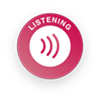
Top Tips For LGBTQ+ Safety Online, By Stonewall
Include this article in your Skills Builder Journal. It could help you develop... 
The internet can sometimes be a bit of a scary place, and home to people who have challenging and hurtful views. In 2017, Stonewall carried out a poll of more than 5,000 LGBT people in Britain and found that ‘one in ten LGBT people (10 per cent) have experienced homophobic, biphobic or transphobic abuse online directed towards them personally in the last month. This number increases to one in four for trans people (26 per cent) directly experiencing transphobic abuse online in the last month.’ So, what can you do to create a safe space? Here’s what Stonewall suggests for Staying Safe Online…

Use the internet for good…
The internet is a place with so many opportunities to change the world for the better. Whether it’s supporting a cause, raising money for charity, sharing posts from other people doing great things online, or simply sending your friend a funny photo to cheer them up, a small step or action can make a huge difference.
Ask if it’s okay…
Think about how your online actions might make others feel, and ask for permission before sharing something about someone else. This includes checking before posting a selfie of you and a friend, or before adding friends into group chats where there might be people they don’t know. If anyone wants to share something about you online you’re not happy with, you have the right to say no.
Report online bullying and harassment…
If someone is treating you or your friends unkindly online, or not respecting you for who you are, you can use the block and report buttons to take positive action to stop it, and make sure you tell someone too. Support your friends and show others how to be respectful and kind online.

Keep your personal information safe, and other people’s too…
This includes full name, date of birth, home address, school address, email address and passwords. Remember, photos and videos can include personal information too.
Think before you post…
Consider the consequences of your online actions and remember that things online can be seen by lots of people. Treat other people the way that you would like to be treated and always think about their feelings. How you talk to someone online is just as important as how you talk to someone face to face.
Remember that not everyone is who they say they are online…
Always get advice from an adult if anyone you only know online makes you feel uncomfortable, or asks to meet up or share personal information or images.

Explore and investigate critically…
The internet is a place with so many different types of content – from communities, videos and music, to apps, filters and information. You can use it to find information on pretty much any topic! We all have different sides to ourselves, and the internet allows you to explore so much. Whilst it’s great there’s so much information, not all of it is trustworthy or helpful. Use your critical thinking skills and talk to those around you to figure out what is reliable, helpful and good for your mental health.
Talk to someone…
It can sometimes be hard to ask for help especially if you don’t know what to say, or what might happen next. Find someone that you trust and go to them if something happens online that makes you feel worried, upset or confused. People who care about you want to help you. It’s never too late to ask for help.
For more information about Stonewall’s work with schools, colleges and children and young people’s services, please visit www.stonewall.org.uk



